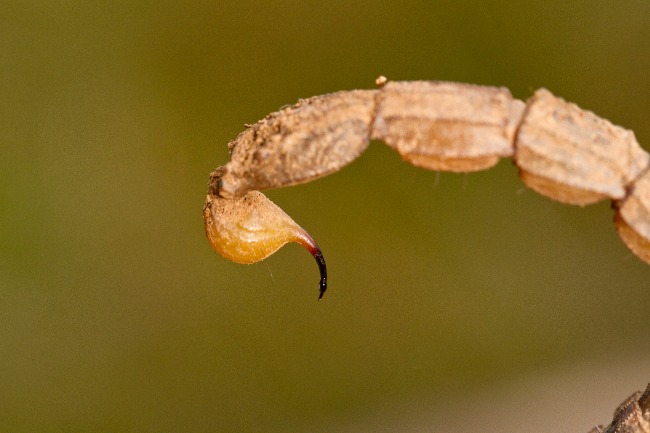While scorpions are not typically aggressive towards humans, they will sting in defense if they feel threatened or cornered.
Most scorpions in Arizona aren’t medically significant, but scorpion sting symptoms are serious and even deadly. Plus, Arizona bark scorpion stings may lead to severe complications, so you should always know the aftereffects of a potential sting.
Whether you’re a curious nature lover, a concerned homeowner, or someone who may have had a recent encounter with a scorpion, this blog will provide valuable insight into scorpion stings and what you should do if you get too up close and personal with one of these pests.
Why Do Scorpions Sting?
Scorpions typically sting humans as a means of defense. They are nocturnal predators and generally not aggressive toward humans. However, if a scorpion feels threatened or cornered, it may use its sting to defend itself.
Accidental encounters are one of the most common reasons for scorpions stings. Whether hibernating or searching for food, scorpions can end up in unlikely locations indoors, like shoes, clothing, or bedding.
If a scorpion is accidentally stepped on, mishandled, or crushed as you get dressed, climb into bed, or pick up objects the scorpion hides within, the tiny arachnid could feel threatened and sting in defense.
Besides chance encounters indoors or in your backyard, scorpions could also get violent if you bother them in their natural habitat. Scorpions are typically located in spaces with rocks, wood piles, or other places where they can hide during the day. Entering these habitats during a hike may trigger a sting.
Typical Scorpion Sting Symptoms
A scorpion sting can cause a range of symptoms, depending on the scorpion and the severity of the sting. Some of the most common symptoms include mild to intense pain at the site of the sting, numbness, tingling, and swelling in the affected area.
Blurred vision, muscle twitching, and spasms are also common but rare. If someone experiences symptoms after being stung by a scorpion, it’s essential to seek medical attention immediately.
Take precautions to prevent scorpion stings, such as wearing protective clothing when entering areas with scorpions, inspecting your shoes and clothes for scorpions before putting them on, and keeping your living space free of clutter and debris where scorpions may hide.
Arizona Bark Scorpion Sting Symptoms
The Arizona bark scorpion is one of the most venomous scorpions in North America, and its sting can cause excruciating symptoms different from the average sting. Stung individuals may experience extreme pain radiating from the sting to other parts of the body.
Numbness, swelling, tingling, muscle spasms, and temporary paralysis are common yet frightening symptoms. It’s not uncommon to have increased sweating, salivation, tearing, and difficulty swallowing and speaking.
Difficulty breathing is a severe side effect, and anyone affected should find immediate medical attention, especially vulnerable populations. Children and the elderly are at a higher risk of experiencing extreme symptoms after being stung by an Arizona bark scorpion.
Visit an urgent care or emergency room even if you experience little to no symptoms, as these stings could quickly turn unpleasant. Sometimes, hospitalization may be necessary for symptoms like breathing difficulties or seizures.
Caring for Scorpion Stings
If someone is stung by a scorpion, it’s essential to seek medical attention immediately. Here are some steps to care for a scorpion sting:
- Call for or seek emergency medical help: If you or anyone else experiences difficulty breathing, seizures, or cardiac arrest, call 911 or your local emergency number immediately. When stung by an Arizona bark scorpion, don’t hesitate to visit a medical facility.
- Remove any tight clothing or jewelry near the sting site: This will help reduce swelling and ensure the affected area doesn’t lose circulation. Don’t be afraid to cut away rings or clothing to keep yourself safe!
- Clean the sting site: After being monitored by a medical professional, keep the wound clean. Use soap and water to clean the area and help prevent infection.
- Apply a cold compress: Place a cold compress on the sting site, such as a bag of ice, to help reduce pain and swelling. You can leave this on for around fifteen minutes to avoid injury.
- Take pain medication: Over-the-counter pain medication, such as ibuprofen or acetaminophen, can help relieve pain and reduce swelling, but always consult with your doctor before taking any medication related to scorpion stings.
- Keep the affected limb elevated: Elevating the affected limb can help reduce swelling and make your recovery easier. Use a pillow and place the affected limb above your heart.
- Monitor Symptoms: Keep an eye out for any new or unusual symptoms. If you or the stung individual experiences any severe symptoms afterward, seek medical attention as soon as possible.
It’s important to note that some scorpions, such as the Arizona bark scorpion, are highly venomous and can cause intense scorpion sting symptoms. In these cases, medical attention is critical and may include the administration of antivenom.
For proven scorpion prevention, rely on Scorpion Repel to keep these dangerous pests out of your home! Most accidental scorpion stings occur indoors when scorpions enter to hibernate or look for food.
Scorpion Repel creates a slick and impenetrable barrier that prevents scorpions from ever coming indoors. To protect yourself and your family, contact us today!

